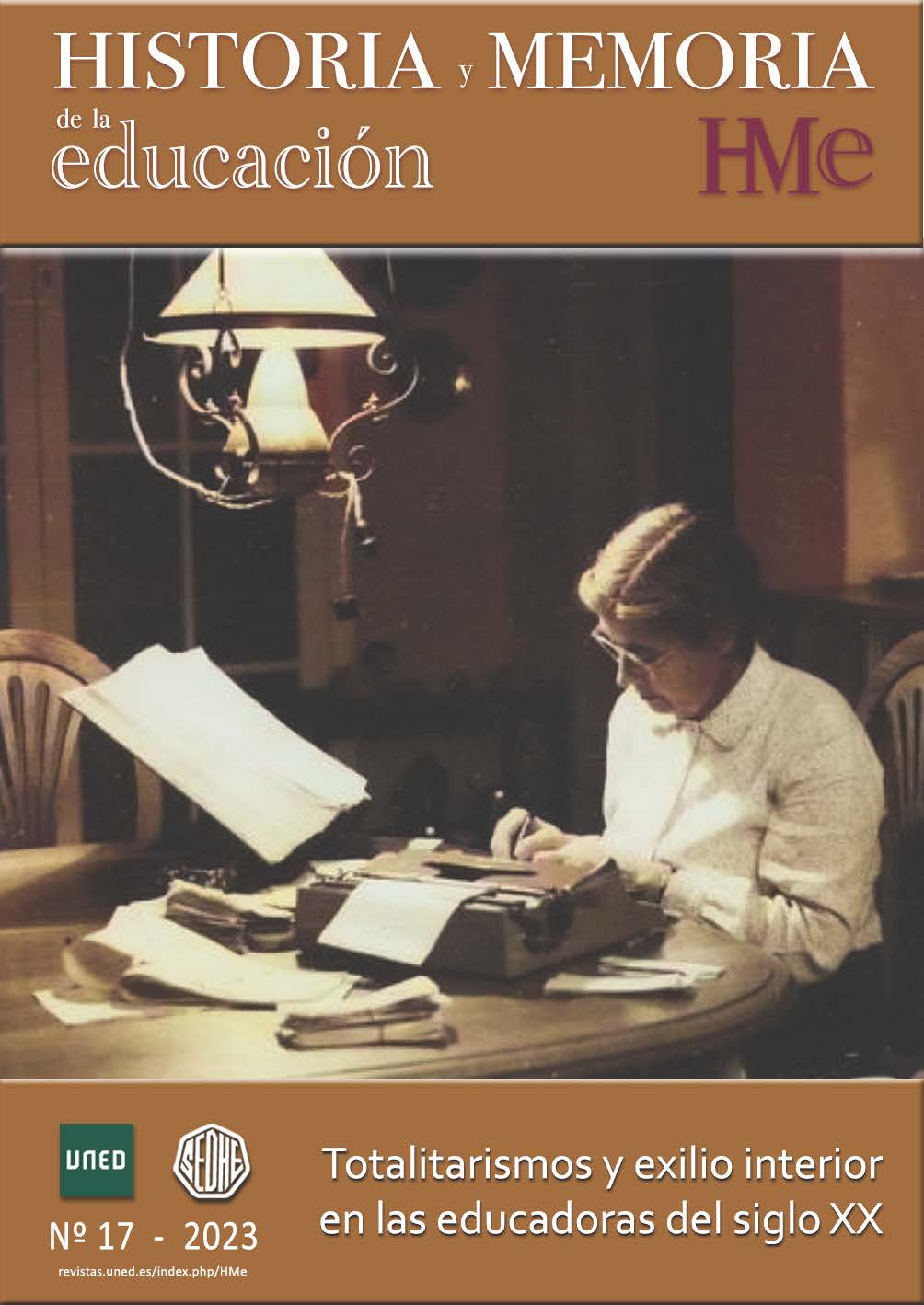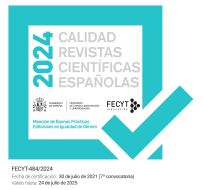Australian women educators’ internal exile and banishment in a centralised patriarchal state school system
DOI:
https://doi.org/10.5944/hme.17.2023.33121Keywords:
Women teachers, Marriage bar, Patriarchy, Centralised state school systemAbstract
This article explores Australian women teachers’ struggles for equality with men from the late nineteenth to the mid-twentieth century. While Australia purported to be a progressive democratic nation, centralised patriarchal state school systems relied on women teachers to fulfil the requirements of free, compulsory and secular schooling. This study focuses on the state of South Australia where women were enfranchised in 1894, far ahead of European countries. However, women teachers were subjected to internal exile in the state school system, and banished by the marriage bar. The article begins with the construction of the South Australian state school system in the late nineteenth century. The enforcement of the marriage bar created a differentiated profession of many young single women who taught prior to marriage; a few married women who required an income; and a cohort of senior single women who made teaching a life-long career and contested other forms of subordination to which all women teachers were subject. Led by the latter group, South Australian women teachers pursued equality in early twentieth century mixed teachers unions and post-suffrage women’s organisations; and established the Women Teachers Guild in 1937 to secure more equal conditions of employment. The paper concludes with the situation after World War Two when married women were re admitted to the state school system to resolve teacher shortages; and campaigns for equal pay gathered momentum. In South Australia, the marriage bar was eventually removed in 1972.
Downloads
References
Bradley, Denise. Inequality of opportunity: a report from the women’s adviser to the Education Department of South Australia. Adelaide: Education Department of South Australia, 1978.
Cavanagh, Sheila. “Female teacher gender and sexuality in twentieth century Ontario, Canada” in History is hers: women educators in twentieth century Ontario, editors R. Coulter and H. Harper, 111-134. Calgary: Detselig Enterprises Ltd., 2005.
De Gabriel, Narciso. “The entrance of women into the teaching profession in Spain (1855-1940) “, History of Education, 43 no. 3 (2014): 334-355.
Donahue, David. “Rhode Island’s last holdout: tenure and married women teachers at the brink of the women’s movement”, History of Education Quarterly, 42 no. 1 (2002): 50-74.
Dwyer, Donna. “Justice at last? The Temporary Teachers Club and the Teaching Service (Married Women) Act 1956”, Labour History, 91 (2006): 151-168.
Flecha Garcia, Consuelo. “Education in Spain: close-up of its history in the twentieth century”, Analytical Reports in International Education, 4 no. 1 (2011): 17-42.
Garcia Hoz, Víctor. “The education of teachers in Spain”, Journal of Educational Research, XLIII no. 8 (1950): 561-570.
Hilliard, David. and Hunt, Arnold. “Religion”, in The Flinders history of South Australia: social history, editor E. Richards, 194-234. Adelaide: Wakefield Press, 1986.
Kyle, Noeline. “Woman’s ‘natural mission’ but man’s real domain: the masculinisation of the state elementary teaching service in New South Wales”, in Battlers and bluestockings: women’s place in Australian education, editors Sandra Taylor and Miriam Henry, 25-36. Canberra: Australian College of Education, 1988.
Mahamud, Kira and Ruiz-Funes, Mª José. “Reconstructing life histories of Spanish primary teachers”, History of Education, 43 no. 6 (2014): 793-819.
Martin, Elaine. “Social work, the family and women’s equality in post-war Australia”, Women’s History Review, 12 no. 3 (2003): 445-468.
Miller, Pavla. Long division: state schooling in South Australian society. Adelaide: Wakefield Press, 1986.
Oram, Alison. Women teachers and feminist politics 1900-1939. Manchester: Manchester University Press, 1996.
Portus, Garnet. “The totalitarian challenge to Australian education”, The Australian Quarterly, 12 no. 4 (1940): 75-80.
Pozo Andres, Mª del Mar and Braster, Sjaak. “The reinvention of the new education movement in the Franco dictatorship (Spain, 1936-1976) “, Paedagogica Historica, 42 no. 1-2 (2006): 109-126.
Roca, Miguel and Marti, Juan. “The pedagogical foundations of primary school inspector Leonor Serrano (1919-1939) “, Paedagogica Historica, 54 no. 3 (2018): 338-354.
San Roman Gago, Sonsoles. “The Spanish schoolmistress: from tradition to modernity”, Paedagogica Historica, 36 no. 2 (2000): 571-600.
San Roman, Sonsoles. “Professional identities of teachers during the social transformation toward democracy in Spain”, in Women and teaching: global perspectives on the feminisation of a profession, editors R. Cortina and S. San Roman, 23-50. New York: Palgrave Macmillan, 2006.
Sawer, Marian. Removal of the Commonwealth marriage bar: a documentary history. Canberra: Centre for Research in Public Sector Management, University of Canberra, 1997.
Terron, Aida; Comelles, Josep and Perdiguero-Gil, Enrique. “Schools and health education in Spain during the dictatorship of General Franco (1939-1975)”, History of Education Review, 46 no. 2 (2017): 208-223.
Theobald, Marjorie and Dwyer, Donna. “An episode in feminist politics: The Married Women (Lecturers and Teachers) Act, 1932-47”, Labour History, 76 (1999): 59-77.
Theobald, Marjorie. “And gladly teach? The making of a woman’s profession”, in Women teaching, women learning: historical perspectives, editors Elizabeth Smyth and Paula Bourne, 65-84. Toronto: Inanna Publications and Education Inc, 2006.
Theobald, Marjorie. Knowing women: origins of women's education in nineteenth-century Australia. Melbourne: Cambridge University Press, 1996.
Trethewey, Lynne. “‘Either you have misunderstood the directions, or you are not playing the game’: South Australian women in educational administration 1900-1960”, Journal of Educational Administration and History, 38 no. 1 (2006): 1-18.
Trethewey, Lynne. and Whitehead, Kay “The city as a site of women teachers’ post-suffrage political activism: Adelaide, South Australia”, Paedagogica Historica, 39 no. 1 /2 (2003): 107-120.
Vicary, Adrian. In the interests of education: a history of teacher unionism in South Australia. St Leonards: Allen & Unwin, 1997.
Whitehead, Kay. “Troubling gender relations with the appointment of ‘that lady inspector’ in post-suffrage South Australia” in“Femininity” and the history of women’s education, editors T. Allender and S. Spencer, 89-118. Palgrave Macmillan, Cham Switzerland, 2021.
Whitehead, Kay. “Vocation, career and character in early twentieth century women teachers’ work in city schools”, History of Education, 34, no. 6 (2005): 579-597.
Whitehead, Kay. “The spinster teacher in Australia from the 1870s to the 1960s”, History of Education Review, 36 no. 1 (2007): 1-17.
Downloads
Published
How to Cite
Issue
Section
License
Copyright (c) 2022 Historia y Memoria de la Educación

This work is licensed under a Creative Commons Attribution-NonCommercial 4.0 International License.
Authors who publish in Historia y Memoria de la Educación agree to the following terms:
- Authors retain copyright and grant the journal right of first publication with the work simultaneously licensed under a Creative Commons Attribution-NonCommercial 4.0 International that allows others to share the work with an acknowledgement of the work's authorship and initial publication in this journal.
- Authors are able to enter into separate, additional contractual arrangements for the non-exclusive distribution of the journal's published version of the work (e.g., post it to an institutional repository or publish it in a book), with an acknowledgement of its initial publication in this journal.
- Authors are permitted and encouraged to post their work online (e.g., in institutional repositories or on their website) prior to and during the submission process, as it can lead to productive exchanges, as well as earlier and greater citation of published work (See The Effect of Open Access).










